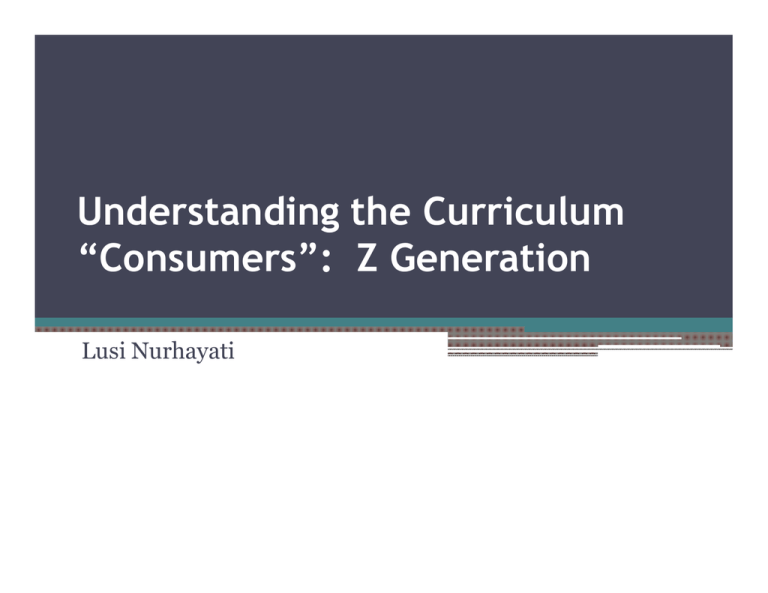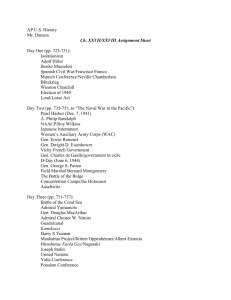Understanding the Curriculum “Consumers”: Z Generation Lusi Nurhayati
advertisement

Understanding the Curriculum “Consumers”: Z Generation Lusi Nurhayati Intro • The majority of innovations and analyses are blind to the bigger and more significant questions surrounding change: Who are the young people in schools? and What, where and how do they learn? --- (Macdonald, 2003) Consumer-product relationship • Young people's interaction with the curriculum is becoming like that of a consumer and a product (Wright and Macdonald ). Learners as ‘consumers’ • Consumers = a person who buys goods or services for their own use. • Curriculum --- “product” • Learners as consumers---they can choose the product that they like • Critical consumers : bypass pre-selected, given, and inert curriculum and seek alternatives Who are in the classrooms? Who is Generation Z • Later half of the Millennial generation born between 1990 and 2002 (11-27 in 2013) Generation X • The generation of people born between 1963 and 1980. • They are described as being individualistic, flexible, technologically proficient and possessing a strong work/life balance. Y Generation • “Born between 1981 and 1994. • are digital natives who grew up using information and communication technology (ICT). • Few members of Generation Y experienced life free from computers or the Internet. • Generation Y also experienced social instability and greater awareness of environmental degradation. • Generation Y is postmodern, individualistic and socially active. (Donohoe,2012). Gen Z • Often associated with excessive consumerism and Internet technology. • Has lived with the Iraq War as a constant. • Put mobile phones, text messaging and social networking as the norm (accepted standard) • Put major concern on the body image • Digitally/Technology savvy and Globally Aware (Cherry 2012) • Instantaneous access to online information encourages transitory subcultural experience. (Donohoe,2012). Will this also happen in Indonesian ? Challenge to Gen Z • too dependent on technology. • Prone to cyber crimes (bullying, identity theft, intellectual property theft) • Some Gen Zs are NOT digital citizens • lack of interpersonal skills that are driven by advancing technologies • need niche skills, but one-size-fits-all education is slow to catch up. Classroom Challenge • Students are digital and many teachers are analog. • Old school teachers tend to not appreciate Gen Z digital skills or how their brains are wired. • Old school teachers are not prepared to teach the “future content” that Gen Zs love (e.g. software, hardware, digital, technological, social media). • Teachers are at a disadvantage because they aren’t as comfortable with technology as their students are. • Gen Z students need to be challenged with projectbased, active learning to meet the demands of the future. Macdonald (2003) • “If curriculum reform continues to focus upon subjects, teachers, school-based lessons and other modernist structures of schools that obfuscate difference, meaningful learning and the impact of technology, the reform movement will become more irrelevant to the lives of young people. 'Blind', 'floundering' and 'failure' will be apt.” conclusion • Common characteristics • Individual differences • We cannot expect them to be like us (in behaving, ways of thinking, style of learning etc) • trans-generation collaboration and understanding • Thank you • 1. gen z: sophisticated • How to deal with the dangers that they may face? • ----make them aware and well-informed about the danger of using the ways that suit their want/needs • --- -Constant feedback • ---- Good communication b/ teacher-parent (partnership)---using tech

